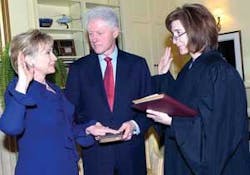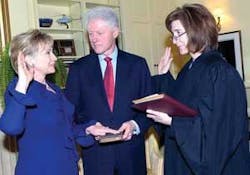Energy security must be an important and integrated element of US foreign policy, US Secretary of State Hillary R. Clinton said as the Senate considered her nomination.
Noting that President Barack H. Obama identified energy as one of his top national security priorities during his presidential campaign, Clinton said she has considered energy security and climate change among the most pressing challenges facing the US and the world.
“These are issues on which I will personally engage, and they will consistently receive high-level attention at the [State] Department. I will work with our friends and partners around the world, who are facing the same challenges. I also intend to ensure that the department works vigorously through the interagency process on these issues,” she said in a written response to questions Sen. Richard D. Lugar (R-Ind.) submitted to her following her Jan. 13 confirmation hearing before the Senate Foreign Relations Committee.
In opening remarks at that hearing, Lugar, the committee’s ranking minority member, said that Russia’s cutting off natural gas supplies was only the most recent example of how energy supply vulnerability constrains US foreign policy options.
Lugar said he looked forward to supporting Obama’s efforts to reduce US dependence on foreign oil. “Yet domestic reform alone will not be sufficient to meet the global threats to our national security, economic health, and climate. In my judgment, energy security must be at the top of our agenda with nearly every country. Progress will require personal engagement by the secretary of state,” Lugar maintained.
‘Not just a cartel’
Lugar said in a speech he delivered at a 2006 North Atlantic Treaty Organization summit in Riga, Latvia, that a country’s halting gas exports in midwinter violated Article 5 of the NATO agreements as surely as tanks and aircraft crossing a country’s border. Clinton agreed, adding: “I think we have learned the hard way that the [Organization of Petroleum Exporting Countries] cartel is not just a cartel, but a security geopolitical strategic effort.” Russia is trying to create a gas equivalent of OPEC, which would give it a much greater multilateral international reach on gas in addition to the bilateral powers it currently has, she said.
“Specifically with respect to Russia and its interactions with Ukraine, Georgia, and other European countries, and its recent purchase of the Serbian gas utility, I hope we can make progress with our friends in NATO and the [European Union] to understand that we do need a broader framework in which we can talk about energy security issues. It may or may not be Article 5, but I think it certainly is a significant energy challenge that we ignore at our peril,” Clinton said.
Sen. George V. Voinovich (R-Ohio) also expressed concern over impacts on European countries’ decision-making of potential Russian gas cutoffs. “It seems to me that we ought to really raise the issue of energy independence in terms of our national security, and also be able to make the right decisions in the world when some of our allies may not be able to because they’re frightened that somebody is going to shut off their gas,” he said.
Clinton responded that this was one reason why Obama has talked about an energy partnership with Latin America, “looking to find ways through technology and other activities we can work together to become more energy independent in this hemisphere.” She said that includes meeting challenges posed by presidents of some energy exporting nations such as Venezuela’s Hugo Chavez and Bolivian’s Juan Evo Morales, as well as concerns expressed by other countries over their energy supplies.
“As you and Sen. Lugar have pointed out, that becomes even more acute in Europe. So I think this deserves a lot of attention,” she told Voinovich. She said she intends to follow a recommendation Lugar originally proposed in 2006 that was signed into law as a provision of the 2007 Energy Independence and Security Act to appoint an international energy affairs coordinator within the department. (Lugar noted, in his written questions, that Clinton’s predecessor, Condoleezza Rice, placed the position within the undersecretary for economic, energy and business affairs’ office. “Thus, the highest ranking State Department official devoted to energy issues remains at the level of office director,” the senator said.)
Caspian pipelines
Lugar also said in his written questions that on Mar. 21, 2008, then-US President George W. Bush appointed a presidential envoy for Eurasian Energy amid new opportunities for US engagement in Central Asia as Russian authorities made a strong effort to exert further control over Caspian region energy supplies. He then asked Clinton what level of US engagement she felt would be helpful to opening trans-Caspian energy trade and investment.
“Vigorous US engagement to promote opening of trans-Caspian energy trade is an important priority for US interests. Russia’s cutoff of gas shipments to Ukraine (and by extension to much of the rest of Europe) in early 2009 (following a similar move in 2006) served as a sharp reminder of how dependent Europe is on energy imports from Russia. That energy dependence can create a degree of political dependence that we should seek to help the Europeans avoid,” she responded.
Noting that the administration of her husband, President Bill Clinton, helped promote the Baku-Ceyhan-Tbilisi pipeline in the 1990s, Hillary Clinton said the US currently “should be heavily engaged in helping to promote stable and transparent energy trade in Europe, including between Russia and Ukraine, and energy diversification for Europe, a goal that requires more energy trade with producers in the Caspian region.” The Eurasian energy issue is complex and requires high-level US attention and engagement, she said, and she intends to consult with the president “and with our energy and national security teams to determine the best way to devote that attention.”
The proposed Nabucco gas pipeline could be a critical element in efforts to diversify European energy supplies, she observed. “Completing such an expensive, complicated, multinational project, however, will require painstaking alignment between commercial and governmental actors. An essential element of such a project will be the commercial fundamentals. A successful strategy to promote Nabucco or other pipelines along the southern corridor to European markets will require consistent, high-level engagement, including by the United States,” Clinton said.
Turkey will be a critical partner in such efforts, and Clinton said she would seek to restore and develop the longstanding US strategic relationship with that country “which has come under strain in recent years.” She said, “Supporting Turkey’s effort to develop and implement sound and sustainable energy policies is in the interest of Turkey, all of Europe and the United States because it will help Turkey be a reliable partner and transit country for gas flowing to other European markets.”
China initiatives
Clinton also said US economic and foreign policies toward China should be closely coordinated, and that the US will press the Chinese government to live up to its commitments in trade agreements and to meet its international responsibilities. Because the Obama administration considers energy security and climate change one of the most pressing challenges facing the US and the world, she said Obama would ask countries that emit the most carbon to join a new Global Energy Forum to lay the foundation for new climate protocols.
“We need to work with China on agreeing to a global carbon cap. We also need to work closely with China and other countries on the development of low-carbon energy technologies to reduce our shared reliance on carbon-intensive technology,” she said in response to Lugar’s written questions.
During the hearing, Clinton noted in a response to Voinovich that Senate Foreign Relations Committee Chairman John F. Kerry (D-Mass.) has a longstanding interest in effective global climate change agreements, and understands that China, India, Russia, and other major nations need to be part of the process leading up to the next major discussions in Copenhagen. “I think, as I say, this can be both included but also independently given attention to by emphasizing energy security, which I intend to do,” she said.
In one of her written responses to Lugar, she said the International Energy Agency should be laying the groundwork now for eventual Chinese and Indian membership to increase energy policy coordination with countries where energy consumption is growing rapidly, to maximize the opportunity for agreeing on energy standards and principles such as transparent energy markets, to ensure the coordinated release of strategic petroleum reserves during a major market disruption, and to maintain IEA’s position as the voice of the world’s major energy consuming nations.
“The center of energy demand growth is shifting away from the [Organization for Economic Cooperation and Development] countries to many of the world’s developing countries. The IEA was created as an institution that represents the interest of the major energy consuming nations. If its membership does not change to reflect who those nations are today, its authority and effectiveness will erode,” Clinton said.
Growing market weight
“The great majority of increased global energy demand in coming years will come from emerging economies, in particular China and India. Both are also building strategic petroleum reserves. Given their growing weight in international energy markets, it is in our interest to include them as members of the [IEA] and to coordinate closely with them on usage of strategic petroleum reserves in case of an oil supply emergency. Global energy security will benefit from the integration of their potentially large strategic reserves into the IEA system,” she continued.
Full membership for China and India in the IEA probably would require modifying the original 1974 International Energy Program treaty agreement which created IEA, but the range of options for potentially integrating the two countries into the organization has not been fully explored, according to Clinton.
“The IEA makes decisions by consensus among the member states, and consensus can and will be reached on how to prepare the IEA for eventual Chinese and Indian membership, even as China and India must also commit themselves to and prepare for IEA membership. The State Department will support these efforts, up to and including revision of the International Energy Program,” she said.
She also said the US should do all that it can to promote adoption of clean energy technology and best practices as developing countries address energy challenges. “The full suite of energy sources (oil, gas, coal, nuclear, and all renewables, in tandem with conservation and efficiency improvements) will be necessary to meet projected global and domestic energy demand over the next 25 years,” she said.
“US foreign assistance that promotes energy access in the developing world should focus on clean energy technology, which includes renewable energy [and] energy efficiency as well as clean coal technology. The United States leads in research, development, and deployment of renewable energy,” Clinton observed.
Bigger expenditures
She said that “a very substantial increase in US assistance” would be needed if the US set a priority of eliminating “energy poverty” with a focus on reliable, affordable, and clean energy.
“Most of the required investment, however, must come from the private sector. In order to mobilize that investment, major policy and regulatory reforms are needed in many countries. Neither public nor private utilities and their investors can generate the capital required to expand access to clean, sustainable energy supplies, for example, when regulatory regimes prevent them from recovering their direct and indirect operating costs,” Clinton said.
“Developing countries must bear primary responsibility for moving the reform process forward. When they do, US assistance can support them in two major ways. First, our technical assistance can help to establish the overall regulatory and policy environment to stimulate new public and private investments. And second, our project-based financial guarantees can help to reduce the perceived risks and costs of mobilizing the much larger flows of private sector financing [which would be] required,” she maintained.

